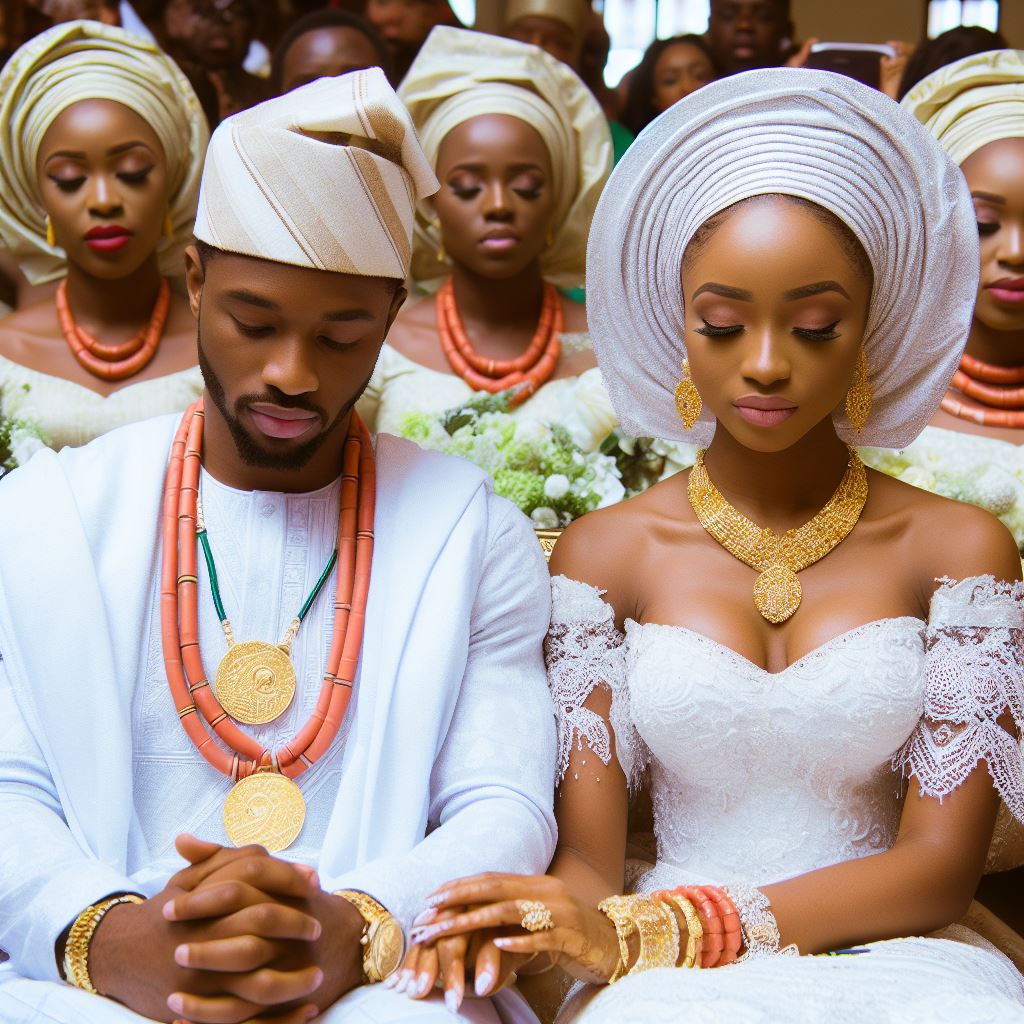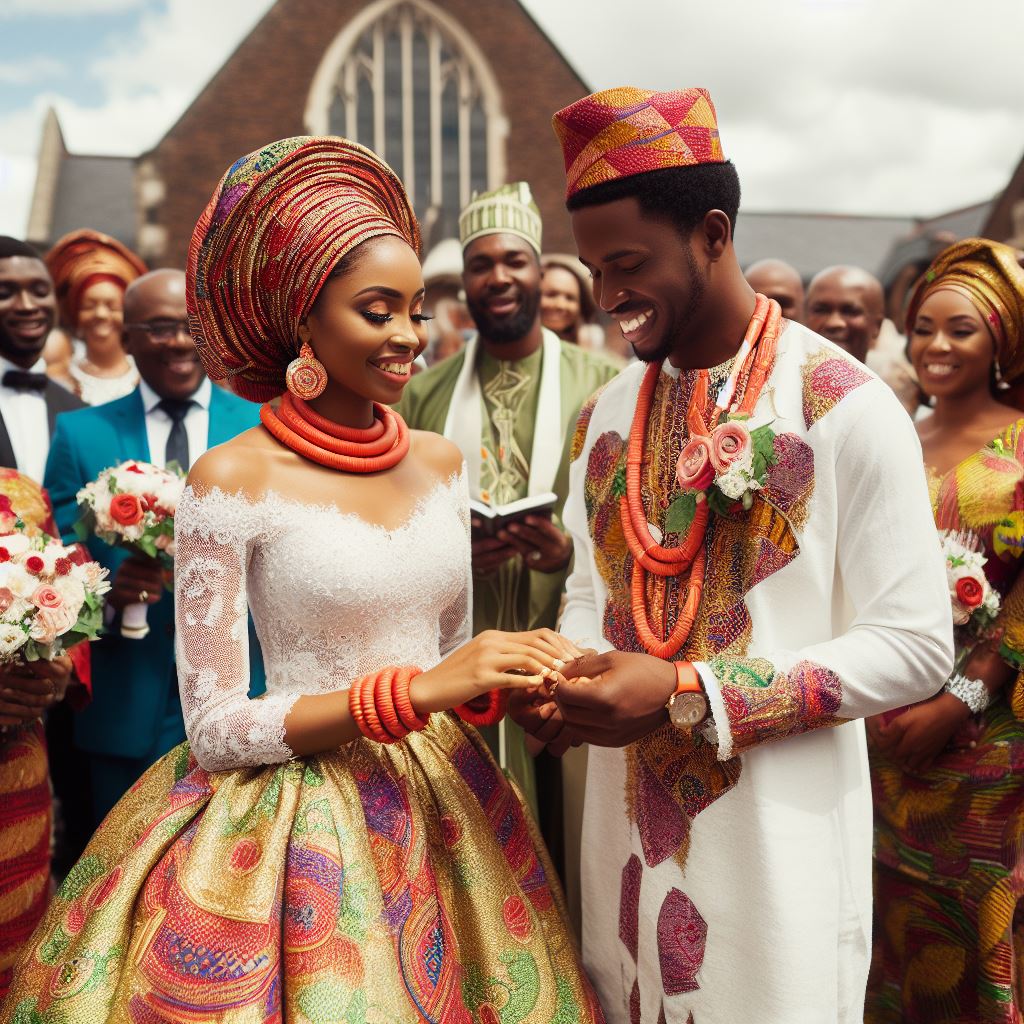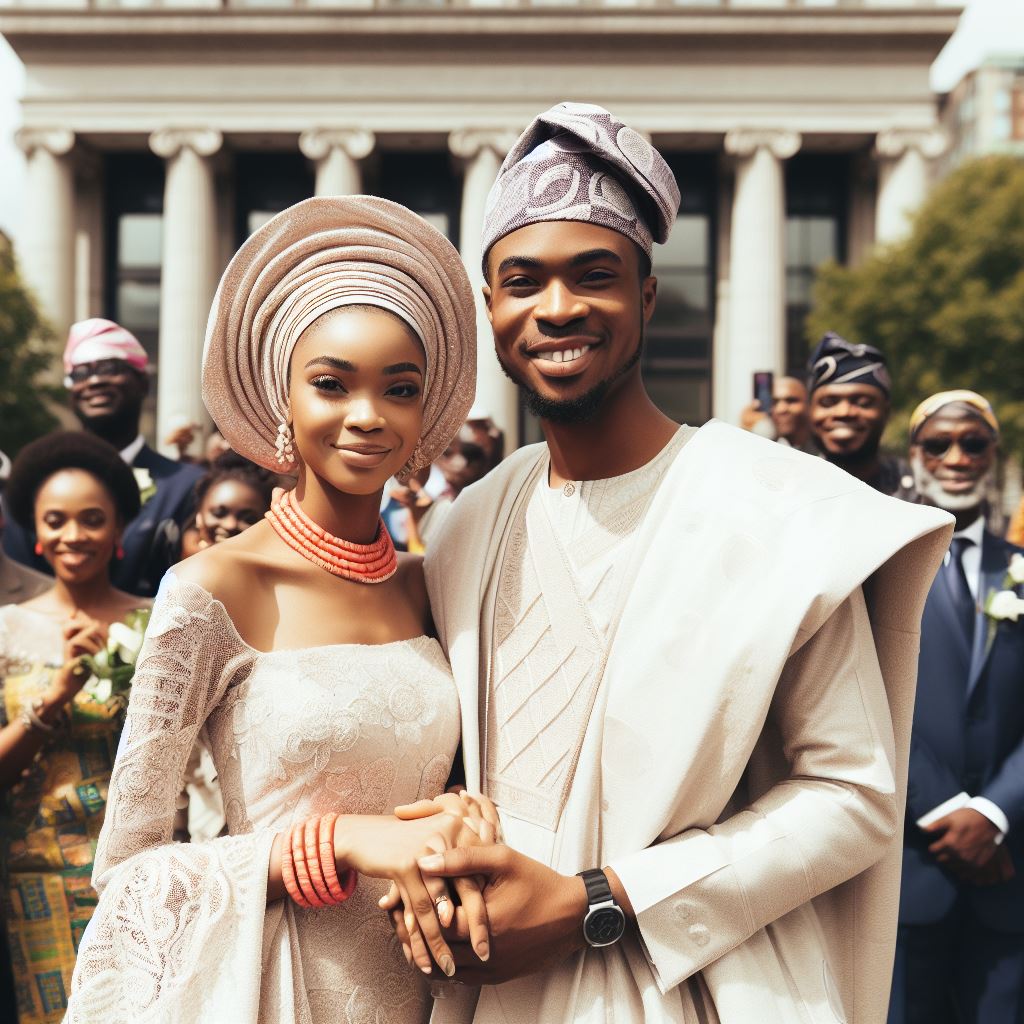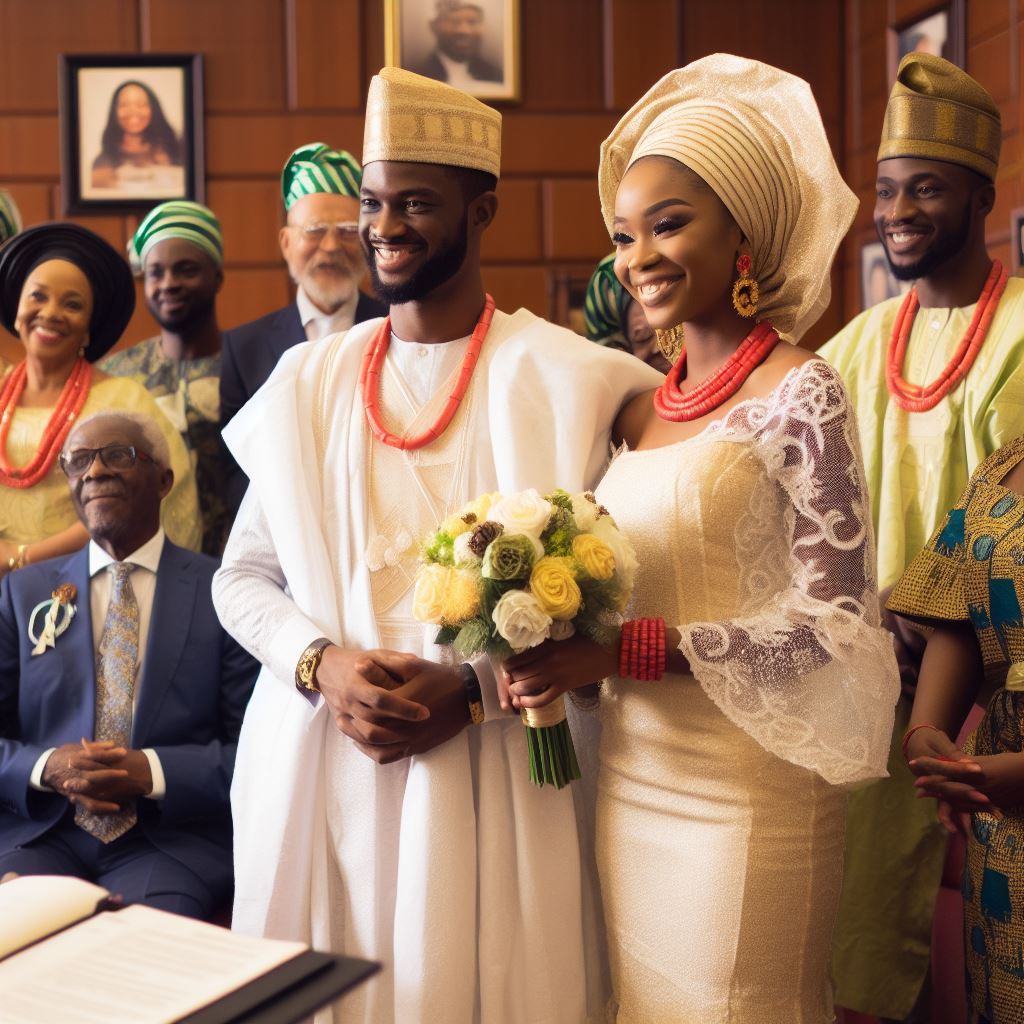Introduction
Overview of courtship and marriage in Nigeria
In Nigeria, courtship and marriage are deeply rooted in cultural traditions and societal expectations.
Brief explanation of Nigerian love journey
The Nigerian love journey involves a series of stages that couples go through before they can get married.
Thesis statement: This blog post explores the stages of courtship leading to marriage in Nigeria.
Courtship in Nigeria begins with the initial attraction and interest between a man and a woman.
The first stage of courtship is the “Itywala”, where the man expresses his interest in the woman.
If the woman reciprocates the interest, the couple will progress to the next stage called “Knocking on the Door”.
During this stage, the man visits the woman’s family to formally ask for her hand in marriage.
Once the woman’s family approves, the couple moves on to the “Introduction” stage.
In this stage, the man introduces his family to the woman’s family, officially informing them of their intentions to marry.
After the introduction, the couple enters the “Lagosization” stage, where they get to know each other on a deeper level.
They spend time together, go on dates, and even meet each other’s friends and extended family.
If their relationship continues to progress, the couple enters the “Traditional Wedding” stage.
In this stage, the families come together for a traditional ceremony that officially joins the couple together.
Finally, after the traditional wedding, the couple can proceed to the “White Wedding” stage, which is the formal wedding ceremony.
This blog post will explore each of these stages in detail and highlight the cultural significance and rituals associated with them.
Basically, the Nigerian love journey is a beautiful progression from courtship to marriage, steeped in tradition and cultural values.
Courtship in Nigerian Culture
Importance of courtship in Nigerian society
- Courtship plays a vital role in the Nigerian society, as it is seen as a precursor to marriage.
- It allows individuals to get to know each other better and determine compatibility.
- During courtship, couples can assess each other’s values, beliefs, and goals for the future.
- It provides an opportunity for emotional connection and deepening of love bonds.
- Courtship allows both parties to observe important factors like communication skills and conflict resolution.
Traditional customs and rituals during courtship
- In Nigerian culture, courtship is often accompanied by various customs and rituals.
- One such tradition is the exchange of gifts between the families of the prospective bride and groom.
- These gifts serve as a symbol of goodwill and mutual respect between the families.
- Another common tradition is the approval of the union by the elders and community leaders.
- Traditional dances and music are also part of courtship rituals, showcasing cultural heritage and celebration.
Role of families in the courtship process
In Nigerian culture, families are pivotal during courtship, guiding, supporting, and facilitating interaction.
Traditional customs, rituals, and community involvement characterize courtship.
- Family involvement is crucial, with parents guiding and advising their children on potential life partners.
- Informal gatherings are organized by families, fostering interaction between the couple and their relatives.
- Family members participate in the decision-making process, ensuring compatibility and mutual agreement.
- Support and blessings from families are fundamental for successful courtship and eventual marriage.
Courtship in Nigerian culture sets the foundation for a harmonious marriage, involving customs, rituals, and community support.
- Courtship allows couples to understand each other deeply, focusing on communication, shared values, and conflict resolution skills.
- Traditional customs, like gift exchanges, symbolize goodwill and mutual respect, fostering strong interfamily relationships.
- Approvals from elders and community leaders emphasize the importance of community support.
- Traditional dances and music during courtship celebrations showcase the vibrancy and richness of Nigerian culture.
The role of families during courtship is pivotal, with parents significantly influencing their children’s choices.
- Their guidance ensures compatibility and a successful match, while informal meetings and gatherings promote interaction.
- A strong familial foundation, supported by both families’ blessings, is vital for successful courtship and marriage in Nigerian culture.
Attraction and Introduction
Initial spark and interest
- The Nigerian love journey begins with the initial spark of attraction between two individuals.
- At this stage, individuals feel a strong sense of interest and curiosity towards each other.
- They may experience butterflies in their stomachs and have an overwhelming desire to know more about the other person.
- Physical appearance, personality traits, and shared interests are some of the factors that contribute to this initial spark.
- Chemistry plays a vital role in creating a strong attraction between potential partners.
Traditional methods of introduction
- In Nigerian culture, traditional methods of introduction are commonly used to initiate contact between two families.
- Family members, close friends, or respected community members act as intermediaries in this process.
- They gather information about potential partners and their families before arranging meetings.
- Meetings often include discussions about values, beliefs, and compatibility.
- In some cases, traditional ceremonies such as the “knocking on the door” are performed to formalize the introduction.
Modern methods of meeting potential partners
- With the advent of technology, modern methods of meeting potential partners have become increasingly popular.
- Online dating platforms and social media have opened up new avenues for individuals to connect.
- They provide opportunities to interact with a larger pool of potential partners from different backgrounds.
- Virtual communication allows individuals to get to know each other before meeting in person.
- While traditional methods still hold significance, modern methods have added convenience and accessibility to the Nigerian love journey.
In the attraction and introduction stage of the Nigerian love journey, individuals experience the initial spark and interest that ignites the start of a potential relationship.
Traditional methods of introduction, involving intermediaries and formal meetings, coexist with modern methods such as online dating platforms and social media.
Both approaches contribute to the diverse ways in which individuals in Nigeria meet and connect with potential partners.
Read: Heartfelt Marriage Messages for a Nigerian Best Friend
Getting to Know Each Other
In this stage of the Nigerian love journey, couples engage in various relationship-building activities.
Relationship-building activities
- Going on dates to explore each other’s interests and hobbies.
- Participating in outdoor activities, such as hiking or picnicking, to foster bonding and create memories.
- Attending cultural events together, like festivals or art exhibitions, to appreciate each other’s heritage.
- Traveling as a couple to experience new places, create shared adventures, and deepen their connection.
- Engaging in mutual hobbies or projects that allow them to work together towards a common goal.
Importance of communication and shared values in Nigerian courtship
- Communication is vital in Nigerian courtship as it helps partners understand each other’s desires, expectations, and concerns.
- Through honest and open communication, couples can build trust and create a solid foundation for their relationship.
- Shared values play a crucial role in Nigerian courtship as they determine the compatibility between partners.
- Discussions about beliefs, ambitions, and life goals help couples assess if they are aligned for a long-term commitment.
- Mutual respect for each other’s values fosters understanding and minimizes conflicts in the relationship.
Assessing compatibility and long-term goals
- During courtship, Nigerian couples carefully evaluate if they share fundamental compatibilities in various aspects.
- Assessing compatibility includes considering factors like educational backgrounds, career aspirations, and family values.
- Couples discuss their expectations regarding marriage, children, and lifestyles to ensure they are compatible for the long term.
- Understanding each other’s long-term goals helps couples determine if they can support and encourage one another.
- Identifying potential challenges and discussing ways to overcome them strengthens the foundation of the relationship.
Therefore, the second stage of the Nigerian love journey focuses on getting to know each other.
During this stage, couples engage in relationship-building activities, emphasizing the importance of communication and shared values.
Assessing compatibility, evaluating long-term goals, and discussing potential challenges pave the way for a successful and fulfilling relationship.
By dedicating time and effort to this stage, Nigerian couples lay a solid foundation for a future filled with love and understanding.
Read: Nigerian-Themed Anniversary Wishes for Friends: Top Picks!

Formalizing the Relationship
Seeking parental blessings and involvement
Before proceeding further, Nigerian couples seek the approval and blessings of their respective parents.
This step is essential as it shows respect for the elders and ensures a strong foundation for the relationship.
Couples engage in open discussions with their parents, expressing their intentions to move forward with the relationship.
Parents play a significant role in determining the compatibility of the couple and offer guidance.
The involvement of parents in decision-making provides a sense of security and support to the couple.
Traditional engagement ceremonies in Nigerian culture
Once parental blessings are received, the couple proceeds to plan and organize a traditional engagement ceremony.
Traditional engagement ceremonies vary across different ethnic groups in Nigeria but share similarities in significance and rituals.
These ceremonies are elaborate affairs filled with rich cultural traditions, music, dance, and food.
The engagement ceremony serves as a public declaration of the couple’s intention to marry and unites their families.
During the ceremony, the couple typically exchanges rings or other symbolic items as a sign of their commitment.
Family members and friends witness the ceremony, creating an atmosphere of joy and celebration.
Exchange of gifts and dowry negotiations
In Nigerian culture, the exchange of gifts and dowry negotiations plays a crucial role in formalizing the relationship.
The groom’s family presents gifts, known as “kola nut,” to the bride’s family as a gesture of goodwill and appreciation.
This exchange symbolizes the union of the two families and demonstrates the groom’s ability to provide for the bride.
Additionally, dowry negotiations take place, where the groom’s family presents a sum of money or other valuables to the bride’s family.
This exchange reflects the groom’s commitment and willingness to take on the responsibility of marriage.
Both families engage in negotiations, aiming to reach a mutually acceptable agreement.
The exchange of gifts and dowry negotiations not only signify the couple’s commitment but also strengthen family ties.
In review, formalizing the relationship in Nigerian love journey involves seeking parental blessings and involvement, organizing traditional engagement ceremonies, and exchanging gifts and negotiating dowry.
These steps solidify the couple’s commitment, unite their families, and uphold Nigerian cultural traditions.
Read: Tips for Crafting Marriage Wishes for Nigerian Elders
Proposal and Acceptance
Significance of marriage proposal in Nigerian culture
- The marriage proposal is a crucial step in Nigerian culture.
- It signifies the intent of the suitor to marry the woman.
- The proposal is a formal request for the woman’s hand in marriage.
- It is seen as a respectful gesture towards the woman’s family.
- The acceptance of the proposal is of great importance in Nigerian culture.
Expectations and rituals during the proposal
- Nigerian proposals often involve elaborate plans and romantic gestures.
- The suitor may seek the assistance of close family and friends for the proposal.
- There is a tradition of asking for the woman’s parents’ blessings before proposing.
- Many Nigerian proposals include the exchange of gifts between the suitor and the woman’s family.
- It is customary for the suitor to present a ring during the proposal.
Acceptance and affirmation of commitment
In Nigerian culture, the marriage proposal is a formal request to marry, often with romantic gestures and family involvement.
- Proposals involve elaborate plans and a ring presented by the suitor.
- Seeking the blessings of the woman’s parents demonstrates respect and unity.
- Accepting the proposal confirms the woman’s commitment to a lifelong partnership.
- It often involves the woman’s family offering their blessings and support.
- This unification strengthens the bond between the couple and their loved ones.
Acceptance also initiates preparations for the traditional Nigerian wedding.
- Various traditional rituals are performed to solidify their engagement.
- These rituals contribute to cultural identity and the foundation for a celebratory wedding ceremony.
In general, the proposal and acceptance stage in Nigerian love journeys are culturally significant.
They involve formal requests, blessings, commitment affirmation, and family unification, setting the stage for traditional weddings.
Read: A Dive into Nigeria’s Royal Wedding Traditions & Wishes
Wedding Preparations
Traditional and modern wedding ceremonies
- Traditional Nigerian weddings are deeply rooted in culture and are vibrant celebrations of love and unity.
- These ceremonies often include symbolic rituals, such as the pouring of libations and the exchange of gifts.
- Traditional attires, like the beautiful Ankara fabrics, play a significant role in showcasing the couple’s heritage.
- In modern Nigerian weddings, couples often incorporate both traditional and contemporary elements to create a unique and personal experience.
- They may opt for Western-style white wedding gowns or tuxedos, alongside traditional Nigerian outfits.
Planning and organizing the wedding festivities
- Planning a Nigerian wedding involves meticulous attention to detail and months of extensive preparation.
- The couple must decide on a suitable date, location, and theme for their special day.
- They must hire vendors for various services, such as catering, photography, venue decoration, and entertainment.
- Creating a guest list and sending out invitations is essential to ensure everyone they want to share their joy with attends.
- The couple may also choose to hire a wedding planner to help alleviate the stress and ensure everything runs smoothly.
Financial and logistical aspects of Nigerian weddings
- Nigerian weddings can be extravagant affairs, with couples and their families willingly investing a significant amount of money.
- Family members and close friends often contribute financially to help cover the cost of the wedding.
- The couple may set up a wedding committee to oversee the financial planning and ensure transparency.
- Logistics, such as transportation, accommodation for out-of-town guests, and ensuring there is enough food and drinks, must be considered.
- Some couples may choose to have multiple pre-wedding events, known as “pre-wedding shoots” or traditional engagement ceremonies, which add to the overall expenses.
List of important wedding preparations:
- Set a budget and determine who will contribute financially.
- Select a suitable date and venue for the wedding ceremony and reception.
- Hire vendors for catering, photography, videography, and decoration.
- Choose a wedding theme and style, combining traditional and modern elements.
- Create a guest list and send out invitations well in advance.
- Plan pre-wedding events such as engagement parties or pre-wedding shoots.
- Consider transportation and accommodation arrangements for out-of-town guests.
- Coordinate with family and friends to ensure a smooth flow of events.
- Finalize the wedding attire and accessories for both the bride and groom.
- Arrange for music and entertainment to keep the guests engaged and entertained.
In a nutshell, Nigerian wedding preparations involve a blend of traditional customs and modern influences.
From choosing the right venue to hiring vendors and managing finances, meticulous planning is crucial to create a memorable celebration of love and unity.
The wedding preparations reflect the significance that Nigerian culture places on the institution of marriage and the desire to showcase that joyous milestone in a grand and beautiful manner.
Wedding Celebration
Importance of wedding celebration in Nigerian culture
- The wedding celebration is a significant event in Nigerian culture.
- It brings families and communities together in a joyous union.
- It is a celebration of love, commitment, and the start of a new life.
- Weddings are also an opportunity to showcase wealth and social status.
- They serve as a platform for cultural display and preservation.
Traditional customs and rituals during wedding ceremonies
- Wedding ceremonies in Nigeria are steeped in age-old customs and rituals.
- The engagement process is usually the first step in the wedding journey.
- It involves the exchange of gifts and dowry negotiations between the families.
- A series of pre-wedding rituals and events follow, such as the bride’s family welcoming the groom.
- The traditional marriage ceremony involves the blessing of the union by both families.
- There are various traditional rituals, including the tying of the bride and groom’s wrists with a white cloth.
- The couple may also take part in symbolic actions like jumping over a broom together.
Symbolism and significance of Nigerian wedding traditions
Nigerian wedding traditions are laden with symbolism and significance, enriching the celebration:
- Gift exchange symbolizes goodwill and family support.
- The dowry signifies the groom’s ability to provide.
- The white cloth represents purity and unity.
- Jumping over the broom signifies the couple’s readiness to face challenges together.
Nigerian weddings extend beyond individuals, uniting families and communities in love, commitment, and cultural richness.
The grandeur showcases wealth and social status.
The engagement initiates the wedding journey through dowry negotiations and gift exchanges.
This significant step solidifies both parties’ commitment, leading to pre-wedding events building excitement.
The traditional marriage ceremony, a culmination of prior stages, receives the formal blessings of families and the community.
It involves various customs and rituals, each carrying profound meaning.
The tying of the couple’s wrists with a white cloth symbolizes unity and mutual support.
Jumping over a broom signifies their readiness to confront challenges together.
Each aspect of these traditions holds deep symbolism, enhancing the wedding’s sanctity.
Gift exchanges symbolize goodwill and support, the dowry represents the groom’s ability to provide, while the white cloth signifies purity and unity.
These symbols contribute to making the wedding ceremony sacred and meaningful.
In summary, Nigerian wedding traditions unite families, communities, and cultural heritage.
Symbolic customs enrich the celebration, signifying love, commitment, and mutual support, making each wedding an unforgettable and profound event.
Uncover the Details: Fostering Love & Mercy: The Essence of Marriage in Islam
Conclusion
Recap of the stages in the Nigerian love journey
In this section, we explored the Nigerian love journey, which encompasses various stages.
First, there’s the initial attraction and courtship phase, where couples get to know each other and build a foundation for their relationship.
Then comes the proposal and engagement, a significant milestone where families are involved and blessings are sought.
Lastly, we have the marriage ceremony, a grand event where two individuals become one.
Cultural significance of courtship and marriage in Nigeria
Courtship and marriage hold immense cultural significance in Nigeria.
They are not just personal commitments but also reflect the values and traditions of the community.
Marriage is seen as a union of two families, bringing people together and strengthening social bonds.
Courtship allows couples to demonstrate their suitability for one another and ensures compatibility within the community.
Final thoughts on the unique aspects of the Nigerian love journey
The Nigerian love journey is distinct in its rituals, traditions, and expectations.
It is a beautiful blend of modernity and tradition, where individuals navigate complex societal expectations while still prioritizing their personal happiness.
The emphasis on family involvement, respect for elders, and cultural practices make this journey one-of-a-kind, creating lasting foundations for long-lasting love and commitment.




